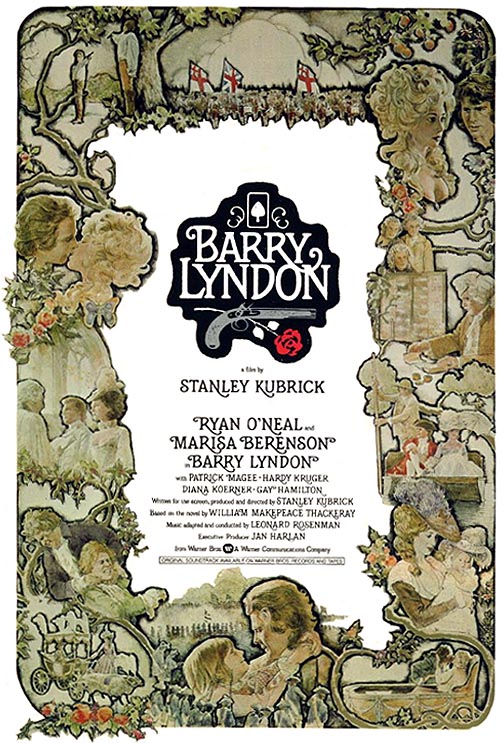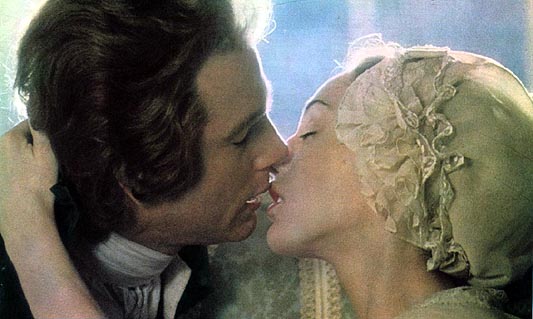![]()
![]()
![]()
![]()
|
Search DVDBeaver |
S E A R C H D V D B e a v e r |
 |
Review by Bill McAlpine Barry Lyndon is Stanley Kubrick's adaptation of the William Makepeace Thackery novel "The Luck of Barry Lyndon", an eighteenth century tale of the rise and fall of Redmond Barry told within a two-part structure.
|

|
In Part I ("By What Means Redmond Barry Acquired the Style and Title of Barry Lyndon") we meet Redmond Barry (Ryan O'Neal), a young, naive and shallow Irish lad of modest means. Barry is in love with his cousin Nora, but doesn't quite know how to conduct himself with her. Tired of Barry's inaction, Nora openly courts the attention of Captain Quinn, a wealthy soldier of the English army. At Quinn and Nora's engagement announcement, an upset Barry dishonors Captain Quinn and both demand satisfaction. Barry appears to kill Quinn in a duel, and to escape persecution, quickly leaves for Dublin.
|

|
In Part II ("Containing an Account of the Misfortunes and Disasters Which Befell Barry Lyndon"), Barry becomes Barry Lyndon by way of marriage and becomes stepfather to Lord Bullingdon, an unloving stepson who sees Barry as a shallow opportunist. He becomes a loving and doting father to his own child Bryan and openly cavorts with his mistresses, all the while ignoring his unloved wife and stepson. Courting society's most influential in pursuit of a title and peerage, Barry is humiliated by his vengeful stepson and his violent reaction results in his own ostracization from society. Personal tragedy strikes the Lyndons and they soon find themselves deep in despair and financial ruin. Lord Bullingdon is covertly summoned by Lyndon staff in a final attempt to save the family name. Bullingdon returns to confront Barry, determined to rescue his mother and to permanently remove Barry Lyndon from society. |

|
One of Kubrick's most meticulous and least appreciated films, 'Barry Lyndon' is a wonderful recreation of an 18th century world. Photographed in a painterly style, utilizing long zooms and natural lighting, languorous pacing and a music score of traditional and baroque music, the film is as much a mesmerizing and realistic view of the past, as '2001' was of the future.
A tale of a poor, opportunistic young man climbing the social ladder in a class-conscious society only to discover, with tragic results that those class barriers are not easily pregnable nor forgiving. Although an 18th century tale, a tale of the futility of class consciousness is still as relevant today and poignantly summarized in the film's Epilogue ("All are Equal Now").
The cinematography by John Alcott is exquisite, convincingly invoking a tranquil, bygone era of the British countryside. Filmed almost entirely in long and medium shots, slow reverse zooms and combined with long takes with minimal editing, wonderfully recreate the pace of 18th century life. Kubrick went so far as to shoot the entire film with only natural light and candlelit interiors, an undertaking that payed off beautifully. Particular mention must also go to Leonard Rosenman's Oscar-winning music score. A mood setting adaption featuring baroque and traditional Irish tunes, with good use of Handel's 'Sarabande' as the opening and closing theme.
It is also, along with Dr. Strangelove, one of Kubrick's most humorous films particularly the film's first half. Robbed at gunpoint by a particularly polite and courteous highwayman and Barry's unwillingness to find his cousin's ribbon, hidden in her bodice, are memorable comic moments. Incidents of fate and irony are utilized to comic effect although the events themselves are not humorous, quite in contrast to the more downbeat and tragic second act.
As with all Kubrick films, the performances here are meticulous and precise with Kubrick making good use of his repertory of character actors (Patrick Magee, Leonard Rossiter, Philip Stone) with memorable turns by Marie Kean (Barry's mother), Hardy Kruger (Captain Potzdorf) and Leon Vitali (Lord Bullingdon). There has been some disappointment expressed over the casting of Ryan O'Neal as Barry, an opinion I do not agree with.
The film was lukewarmly received on its
December 1975 premiere, however it did find itself on many
Top 10 lists and was nominated for 7 Academy Awards including Best Picture and
Best Director. The
film has never quite been given the adoration that other Kubrick films receive,
no doubt due to the
subject matter, time period and length of the film. Unfortunate, as this is one
of Kubrick's very best. |
![]()
![]()
![]()
![]()
